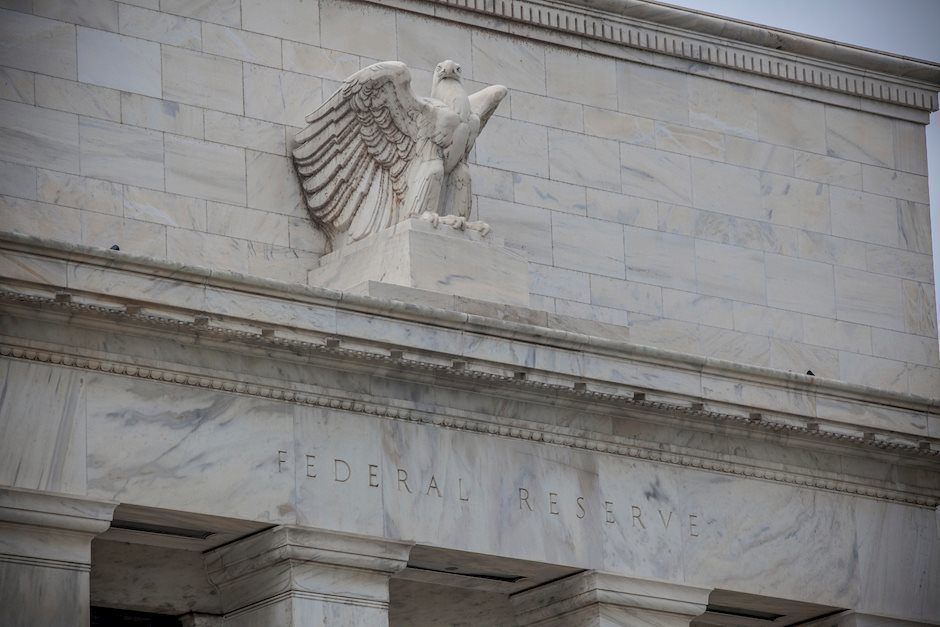It's too early for the Fed to declare “mission accomplished”

At its December meeting, the Federal Reserve effectively declared victory over inflation. They didn’t didn’t use those words, but that was the signal given by the policy trajectory laid out by the FOMC.
Is this victory dance premature?
Financial analyst Jim Grant thinks so.
In an interview on Bloomberg Markets: The Close with Romaine Bostick, Grant said it’s way too early for the Fed to say “mission accomplished.”
According to the Fed’s “dot plot” showing the expected trajectory of interest rates. The central bank has penciled in three rate cuts for 2024 with another four cuts in 2025. That would lower rates to between 2 and 2.5 percent.
Federal Reserve Chairman Jerome Powell tried to temper this projection, emphasizing that inflation remains too high.
Inflation has eased from its highs, and this has come without a significant increase in unemployment. That’s very good news. But inflation is still too high. Ongoing progress in bringing it down is not assured and the path forward is uncertain.
Powell was talking, but the markets weren’t listening. As Bostick put it, they were all in on “mission accomplished.”
Grant disagreed with the notion that inflation is beat saying it is “endemic.” In other words, regularly occurring.
It recedes. It reappears. It never disappears.
Grant pointed out that the federal government is running massive budget deficits even with unemployment at 3.7 percent.
The Fed is all too eager, I think, to imply, if not declare, ‘mission accomplished.
Bostick asked Grant why he thinks the Fed even felt the need to communicate rate cuts at this stage in the inflation fight. Grant said that if he could “read the mind of the composite Federal Reserve,” he thinks he would “impute this great insight.”
I think that they would say to themselves, ‘The cost, the unseen but still considerable cost of a decade’s worth of zero percent interest rates is a great malinvestment, as they say in the economic quarterlies.’ You know, the white elephants that spring up when money is free.
Artificially low interest rates incentivize borrowing and debt. This blows up economic bubbles. When the central bank tries to normalize rates, these bubbles inevitably pop. This cycle is no exception. We’re already seeing signs of distress in the economy with more corporate bankruptcies in 2023 than the pandemic year.
Grant said officials at the Fed are likely cognizant of this fact even if they would never say it out loud.
Misallocation of capital, let us call them misguided because of the false interest rates on offer, introduced an element of frailty in the structure of things. And what the Fed might be thinking is that notwithstanding a 3.7 percent unemployment, notwithstanding great looks you get from the Atlanta GDP Now data, notwithstanding all that, we don’t want to overdo it because of this underlying frailty induced by this decade-long experiment with zero percent borrowing cost.
Grant called inflation an “arbitrarily imposed tax,” and he said the new stance taken by the Fed, whether explicit or implicit, is basically “imposing a tax on the possibility of a sustained policy of much higher inflation than they had promised us.”
Grant went on to call the Fed’s 2 percent target a “dubious proposition.”
Money is what you get for work, which means money is heartbeats. … They’re not infinite, these heartbeats. And if you tax them through the depreciation of the currency – through a contemplated and intended depreciation of the currency – you are legislating, without a vote, a tax on the working lives of Americans. So, I think as a moral proposition, it’s dubious.
Milton Friedman said inflation is always and everywhere a monetary phenomenon. Grant said he would call it “always and everywhere a moral phenomenon.”
When you boil it all down, the Federal Reserve is stuck between a rock and a hard place. The question becomes what is the bigger burden – higher borrowing costs or higher price inflation?
Grant said he thinks Jerome Powell and other members of the Federal Reserve look in the mirror and see themselves as Captain Chesley Burnett "Sully" Sullenberger who landed a crippled U.S. Airways jet on the Hudson River.
The Fed has arrogated to itself the role of central planning agency. … It’s going to try to balance economic growth with the stability and integrity of the currency. How do they do that? I don’t think it’s given to mortal man and woman to do these things.
Grant said he has proved to the readers of Grant’s Interest Rate Observer he can’t successfully predict the future no matter how hard he tries.
But the Fed has unintentionally done the same without acknowledging the same. However, it is proceeding as if it did have tomorrow’s newspaper in its hands, which it doesn’t
To receive free commentary and analysis on the gold and silver markets, click here to be added to the Money Metals news service.
Author

Mike Maharrey
Money Metals Exchange
Mike Maharrey is a journalist and market analyst for MoneyMetals.com with over a decade of experience in precious metals. He holds a BS in accounting from the University of Kentucky and a BA in journalism from the University of South Florida.

















